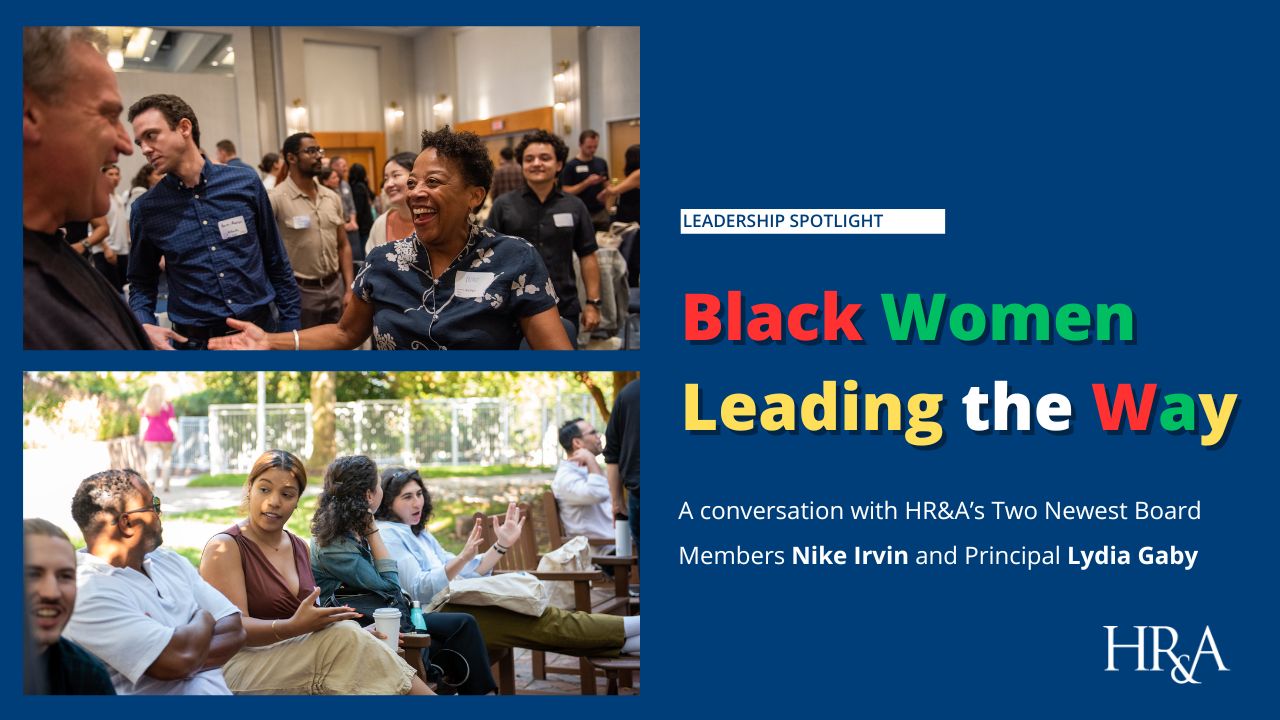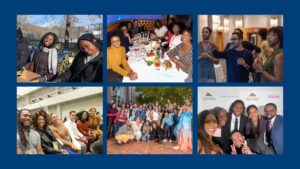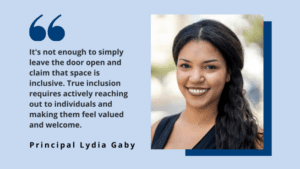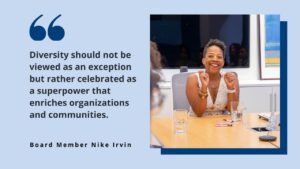on Feb 29, 2024
Black Women Leading the Way: A Conversation with HR&A’s Two Newest Board Members

Black Women Leading the Way: A Conversation with HR&A’s Two Newest Board Members
We sat down with HR&A’s two newest Board Members, Principal Lydia Gaby and Nike Irvin, to learn more about their experiences as Black women in organizational and leadership roles. Nike and Lydia share personal stories underscoring the importance of support networks, proactive allyship, and inclusivity in creating environments conducive to everyone’s success, while also recognizing the ongoing journey towards representation, equity, and inclusion in leadership.
As a Black woman contributing to the culture and strategic direction at HR&A and other companies where you serve on Boards, how does your lived experience influence your leadership style and approach to mentorship?
Lydia: One of the things I often say is that I’ve never met an institution that was designed for me. Never. Part of that comes from having a biracial background and never fitting entirely into any homogenous community. When you’re in the in-betweens, you need to find a way to navigate and bring visibility to your issues or else you are solving all of your own problems, especially if you’re a high achiever.
One of the key strategies I’ve implemented is the concept of “wraparound support,” where individuals are seen and supported in their entirety, rather than just addressing visible issues. This approach not only helped me overcome challenges but also inspired me to create support systems for others facing similar hurdles.
Nike: My recent experience at the HR&A Summit in Eastern Shore Maryland struck me with an exceptional energy and creativity within the Black Employee Resource Group, which I found to be truly noteworthy. The camaraderie and level of engagement was noticeable, particularly during activities like the Jeopardy game. It was clear to me that there is a strong sense of connectivity within the group, leading to both tangible and intangible benefits such as feeling supported, valued, and understood.

This experience reminded me of a pivotal moment in my previous role at the California Community Foundation, where I was the senior most ranking Black staff member during a time of societal unrest following tragic events like the Mother Emanuel shooting, Eric Garner, and Trayvon Martin. In a moment of uncertainty, I was approached by younger African American colleagues seeking guidance, and while I didn’t have all the answers, I recognized the power of collaboration and solidarity. Together, we formed a support group that provided a sense of community and resilience during difficult times. It’s clear to me that initiatives like these not only provide a sense of belonging for employees but also contribute to a more inclusive and supportive workplace culture.
My observations at the Summit underscore the importance of HR&A’s Employee Resource Groups and similar initiatives in fostering connectivity, support, and resilience within organizations. By leveraging the collective strength and diversity of its members, companies can create environments where all employees feel valued, seen, and empowered to make meaningful contributions.
Lydia, with your recent appointment to the board as its employee-owner representative, from your perspective, how does your presence impact the direction of decision-making processes within the ?
Lydia: In anticipation of my first upcoming board meeting, I’m actively thinking of the strategies I’ll bring to the table. I’m eagerly preparing to leverage my voice and perspective within the boardroom, particularly drawing inspiration from Nike. As our company experiences growth and evolution, I firmly believe that tapping into the collective wisdom of our consulting staff is essential for charting our course forward. Solutions often emerge from within the organization, and having staff representation ensures that their perspectives shape our decisions.
My excitement for this role stems from my belief in a participatory decision-making process. Throughout my tenure at HR&A, I’ve worn various hats, from Research Analyst to Principal, giving me a comprehensive understanding of the company’s operations and the challenges our staff encounter daily. Moreover, as an employee-owned company, I see this opportunity as a means to further explore how staff can collaboratively shape our organization’s future. By bridging the gap between leadership and employees, we can ensure that our decisions align with our collective mission and values.
In essence, I am eager to bring my diverse experiences and perspectives to the boardroom, working alongside my colleagues to steer HR&A towards a future that prioritizes the employee experience and serves our communities effectively.
How do you believe personal connection and proactive outreach contribute to fostering inclusive communities within organizations and groups?
Lydia: One crucial aspect of fostering inclusive communities is recognizing the importance of personal connection. Oftentimes, individuals may feel hesitant to fully engage in certain groups or organizations because they don’t feel centered or welcomed. I’ve personally encountered situations where I joined groups but didn’t quite feel like I belonged, leading me to take a proactive approach in reaching out to others. This can involve extending personal invitations, creating opportunities for meaningful engagement, and addressing any barriers that may prevent certain individuals from fully participating.

Nike: That statement reminds me of a powerful analogy shared by a friend who worked in Diversity, Equity, and Inclusion at Netflix. They said diversity is having a party, equity is playing music that I like, and inclusion is inviting me to dance. This metaphor highlights the multifaceted nature of creating inclusive environments and emphasizes the importance of taking deliberate actions to ensure that all individuals feel seen, heard, and valued. Ultimately, building strong and supportive communities requires more than just symbolic gestures. It requires genuine effort, empathy, and a willingness to challenge existing norms and practices that may perpetuate exclusion. By prioritizing personal connections and actively working to foster inclusivity, we can create spaces where everyone feels like they truly belong.
Nike you serve on multiple Boards, can you discuss the significance of diversity for Boards of Directors, particularly in terms of minority representation?
Nike: I think it’s important to take the time to reframe discourse surrounding this word, “minority.” In California, where traditional notions of majority and minority may seem obsolete, it’s important to recognize the power dynamics at play. Recently, I was inspired by Common, the rapper and activist, who rejects the label of “minority” as it undermines one’s worth and contribution. This resonated deeply with me, emphasizing the importance of language, and framing in shaping perceptions.
As a trustee and advisor, I strive to influence policies and practices that prioritize fairness and recognition of individuals’ contributions, regardless of societal labels. It is through intentional actions and thoughtful dialogue that we can truly embody the principles of diversity, equity, and inclusion.

What are your thoughts on the unique challenges that black women face in organizations or leadership roles today?
Nike: In our society, there are often moments that weigh heavily on the experiences of Black women. Recently, we witnessed the resignation of Harvard’s president Dr. Claudine Gay. It’s still evident that despite attaining high levels of success and leadership, Black women continue to experience relentless and disproportionate scrutiny, underestimation, and marginalization.
However, amidst these struggles, there are glimmers of hope. Celebrating milestones like Lydia’s appointment to the board of HR&A, and my own privilege to serve on various boards, demonstrates progress. Additionally, the increasing number of Black women attaining degrees and the gradual closure of the pay equity gap are positive indicators of change. While there are reasons to remain cautious, it’s essential to acknowledge and celebrate these advancements. As we navigate the complexities of societal dynamics, let us continue to uplift and support the resilience of Black women, ensuring that their contributions are recognized and valued.
Lydia: As a Harvard graduate, I can’t help but acknowledge the complexities that come with being a part of such a prestigious institution. My time there was filled with both wonderful moments and significant challenges. Notwithstanding the very intense political dynamics currently at play on campus, the recent events surrounding President Gay have prompted me to consider the unique pressures that women in leadership positions face. It’s clear that women in positions of power are held to a higher standard, expected to embody an unimpeachable character while navigating the intricacies of leadership. What struck me most about President Gay’s situation was the overtly political nature of the attacks against her, which were conducted without regard for fairness or integrity. The fact that these attacks were allowed to persist, ultimately leading to President Gay’s resignation, is a disappointing reminder of the hostile environment that Black women leaders often find themselves in. It underscores the importance of not only advocating for oneself but also building a network of supportive allies who can help navigate and mitigate such challenges.
As a Black woman, I am aware of the strategic role that we must play in leadership positions, constantly balancing the need to assert ourselves and navigate systemic biases. It’s a delicate balance, and one that requires resilience, determination, and a strong support network. Ultimately, the events at Harvard serve as a stark reminder of the uphill battle that women, particularly women of color, face in leadership. While progress has been made, there is still much work to be done to ensure that all individuals have the opportunity to thrive in positions of power, free from undue scrutiny and bias.